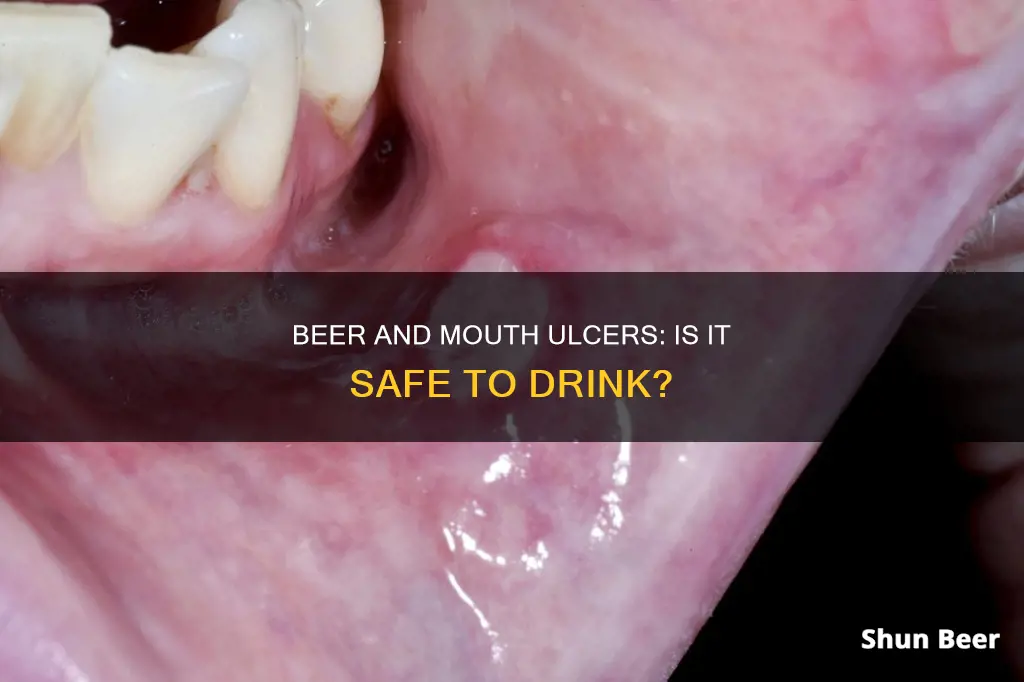
Mouth ulcers are painful sores that develop on the mucous membranes inside the mouth. While they usually heal on their own within a week or two, certain foods and drinks can irritate them and prolong the healing process. Alcoholic beverages, including beer, wine, and spirits, are known to irritate mouth ulcers and slow down the healing process. The acidic and inflammatory nature of alcohol can cause inflammation and irritate the soft tissues of the cheeks, gums, and tongue, making it uncomfortable to eat, drink, or even talk. Additionally, alcohol can affect the production of saliva, further contributing to a dry mouth and creating an environment conducive to the development of mouth ulcers. While the evidence linking alcohol consumption to the development of mouth ulcers is still emerging, it is generally recommended to avoid alcoholic beverages until the ulcers have healed completely.
What You'll Learn
- Beer releases a chemical that causes the stomach to produce more acid, which can irritate mouth ulcers
- Alcohol can prevent mouth ulcers from healing
- Alcohol can cause an acidic environment in the mouth, inflaming soft tissues
- Drinking beer with a mouth ulcer may increase pain
- Beer and other alcoholic drinks can make mouth ulcers worse

Beer releases a chemical that causes the stomach to produce more acid, which can irritate mouth ulcers
Drinking beer with a mouth ulcer is not advisable. Alcoholic beverages sting when they come into contact with mouth ulcers and can slow down the healing process. Beer, wine, and spirits should be avoided until mouth ulcers have completely healed.
Beer releases a chemical called gastrin, which causes the stomach to produce more acid. Doctors believe that it is not only the alcohol in beer that causes this effect but also parts of the fermentation process of making beer.
The acid will irritate the ulcer, making it harder for the ulcer to heal. Choosing a beverage other than beer can benefit your stomach and won't harm your ulcer.
In addition to the increase in acid, alcohol's acidic nature and tendency to deplete the body's moisture and nutrients create an environment that is conducive to the development of painful ulcers. Alcohol's dehydrating effects suppress saliva production, which is important for protecting and moisturising oral tissues. Without adequate salivary flow, the tissue can crack, split, and transform into aphthous ulcers.
Alcohol is also highly inflammatory. Acetaldehyde, the first byproduct of alcohol metabolism, triggers widespread inflammation by increasing cytokine and prostaglandin production. This prevents effective tissue healing while also exacerbating ulcerative lesions.
Therefore, drinking beer with a mouth ulcer is not recommended due to the increase in stomach acid and the inflammatory and acidic nature of alcohol, all of which can irritate and slow the healing of mouth ulcers.
Beer and Heartburn: What's the Connection?
You may want to see also

Alcohol can prevent mouth ulcers from healing
Secondly, alcohol has dehydrating effects, suppressing saliva production. Salivary flow is important to protect and moisten oral tissues. Without it, the tissue can crack, split, and develop into mouth ulcers.
Thirdly, alcohol is highly inflammatory. Acetaldehyde, a byproduct of alcohol metabolism, triggers inflammation by increasing cytokine and prostaglandin production, which prevents effective tissue healing and exacerbates ulcerative lesions.
Finally, heavy drinking is associated with vitamin deficiencies, particularly folate, B12, and zinc. These vitamins are essential for maintaining the integrity and regeneration capacity of the mucosal lining. A lack of these vitamins can leave the lining weakened and prone to ulcerous wounds.
Therefore, it is advisable to avoid alcohol if you have a mouth ulcer, as it can prevent healing and worsen symptoms.
Beer and Freemasons: Drinking Before Lodge Meetings
You may want to see also

Alcohol can cause an acidic environment in the mouth, inflaming soft tissues
Alcohol is known to disrupt the pH balance in the mouth, creating an acidic environment that can inflame soft tissues in the oral cavity. This is due to the low pH of alcohol itself, which ranges from 3.3 to 5, as well as the common mixers that are often paired with alcoholic beverages. This acidity can wear away at the protective mucous membranes in the mouth, causing inflammation and irritation.
Alcohol's acidic nature can lead to direct irritation of the mouth tissue, particularly the cheeks, gums, and tongue. This irritation creates an inflammatory environment that, over time, leaves these areas raw and vulnerable to painful ulcer formation. The ethanol in alcohol also has dehydrating effects, suppressing saliva production and leading to dry mouth. Salivary flow is crucial for protecting and moisturising oral tissues, and when it is reduced, the tissue can crack, split, and transform into aphthous ulcers.
Additionally, alcohol is highly inflammatory. Acetaldehyde, the first byproduct of alcohol metabolism, triggers inflammation by increasing the production of cytokine and prostaglandin (pro-inflammatory molecules). This not only prevents effective tissue healing but also exacerbates existing ulcerative lesions. Heavy drinking also depletes the body of essential nutrients such as folate, B12 (thiamine), and zinc, which are vital for maintaining the integrity and regeneration capacity of the mucosal lining.
The combination of these factors—acidity, dehydration, inflammation, and nutrient depletion—creates the perfect storm for painful mouth ulcers to develop and persist. Therefore, it is generally recommended to avoid alcoholic beverages, including beer, when dealing with mouth ulcers, as they can irritate and slow down the healing process.
Japan's Beer Culture: A Historical Perspective
You may want to see also

Drinking beer with a mouth ulcer may increase pain
Alcohol can irritate the lining of the mouth, leading to the development of mouth ulcers. It creates an acidic environment that inflames the soft tissues of the cheeks, gums, and tongue. Alcohol also has a dehydrating effect, suppressing saliva production, which is important for protecting and moisturising oral tissues. In addition, alcohol is highly inflammatory and can trigger widespread inflammation in the body, preventing effective tissue healing.
Heavy drinking is generally bad for oral health, increasing the risk of tooth decay, gum disease, and oral cancer. Alcohol consumption can also deplete the body of moisture and nutrients, creating an environment conducive to the formation of painful mouth ulcers. Alcohol withdrawal can also trigger the development of mouth ulcers due to the stress it places on the body.
While mouth ulcers usually heal on their own within 7 to 14 days, avoiding alcohol can help alleviate discomfort and speed up the healing process. It is recommended to maintain good oral hygiene by gently brushing with a soft-bristled toothbrush and using a mild, alcohol-free mouthwash to prevent further irritation to the ulcer.
The Science of Beer Tubes: How Do They Work?
You may want to see also

Beer and other alcoholic drinks can make mouth ulcers worse
While alcohol is not a direct cause of mouth ulcers, it can certainly make them worse. Alcoholic drinks such as beer, wine, or spirits can irritate and prolong the healing process of mouth ulcers. The high acidity of alcohol creates an inflammatory environment in the mouth, wearing away at the protective mucous membranes of the cheeks, gums, and tongue. This leaves these areas raw and vulnerable to painful ulcer formation. The dehydrating effects of alcohol also suppress saliva production, which serves to protect and moisten oral tissues.
Alcohol also increases stomach acid production, which can irritate a stomach ulcer and make it more painful. Drinking alcohol can worsen the symptoms of stomach ulcers, such as abdominal pain, nausea, and a feeling of fullness. It can also cause a burning sensation in the stomach that doesn't go away. Beer, in particular, releases a chemical called gastrin, which causes the stomach to produce more acid. This increase in acid will irritate a stomach ulcer and slow down the healing process.
In addition, alcohol can cause or contribute to the development of mouth ulcers in several ways. Firstly, the direct irritation of mouth tissue by alcohol, which has an acidic pH ranging from 3.3 to 5. Secondly, alcohol's dehydrating effects suppress saliva production, leaving the tissue vulnerable to cracking and transforming into aphthous ulcers. Thirdly, alcohol is highly inflammatory, and its metabolism triggers the production of pro-inflammatory molecules, preventing effective tissue healing and exacerbating ulcerative lesions. Lastly, heavy drinking depletes the body of nutrients such as folate, vitamin B12, and zinc, which are important for maintaining the integrity and regeneration capacity of the mucosal lining.
Therefore, it is advisable to avoid alcoholic drinks, including beer, if you have a mouth or stomach ulcer.
Beer and Bowel Movements: The Loose Stool Link
You may want to see also
Frequently asked questions
No, it is not recommended to drink beer or any other alcoholic beverage when you have a mouth ulcer. Alcoholic drinks can irritate the ulcer, making it more painful and slowing down the healing process.
Mouth ulcers are open sores that develop on the mucous membranes inside the mouth. They are often caused by minor injuries, toothbrush abrasions, nutritional deficiencies, or heavy alcohol consumption.
Mouth ulcers typically heal on their own within 7-14 days. However, persistent ulcers can indicate more serious conditions such as autoimmune disorders, oral cancer, or infections.
It is recommended to avoid acidic, spicy, crunchy, and salty foods, as well as alcoholic and carbonated beverages, as these can irritate the ulcer and prolong healing. Instead, opt for soothing and non-acidic options like water, herbal teas, aloe vera juice, or coconut water.
There are several home remedies that can help alleviate the discomfort of mouth ulcers, including saltwater rinses, over-the-counter mouthwashes and topical analgesic gels, and maintaining good oral hygiene with a soft-bristled toothbrush and mild, alcohol-free mouthwash.







